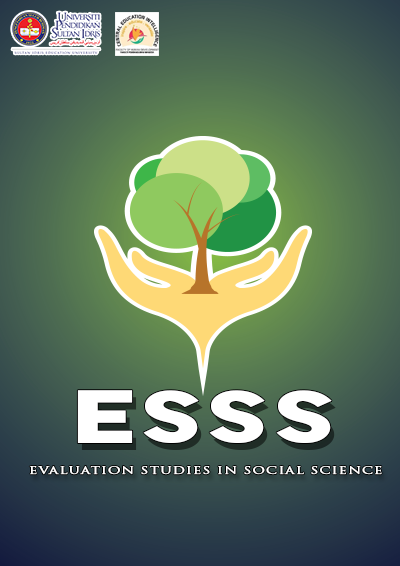Family Socioeconomic Influences on Secondary School Students' Readiness to Learn
Pengaruh Sosioekonomi Keluarga Terhadap Kesediaan Belajar Pelajar Sekolah Menengah
DOI:
https://doi.org/10.37134/esss.vol4.1.1.2023Keywords:
Influence, family sosieconomic status, readiness to learnAbstract
This study aims to identify the socio-economic influence of the family on the readiness to learn of secondary school students. The socio-economic aspects studied in this study are reading material facilities and infrastructure facilities. This study uses a case study design with 15 people as a study sample. The study sample consisted of six students, six parents and three teachers. The students who have a problem of readiness to learn were selected as the study sample. Data is obtained through interviews, observations and document analysis. The data obtained, then triangulated. Interview data findings were determined with the Cohen Kappa coding validation process. The findings of the study show that the aspects of infrastructure facilities and reading material facilities are very important in helping to foster learning readiness. In conclusion, family socioeconomics is a very important aspect in helping to foster high school students' willingness to learn. The implication of this study is that the Ministery of Education and the school can take appropriate steps and provide financial assistance and reading materials to students who are facing serious learning readiness problems.
Downloads
References
Agherdien, N. M. M. (2018). Factors Impacting On Students’ Readiness For Higher Education. Africa Education Review, 15(1), 52-71.
Akubuilo, F. (2015). Reading Readiness Deficiency in Children: Causes and Ways of Improvement. Journal of Education and Practice, 6(24), 38-43.
American Psychological Association. (2007). APA Dictionary of Psychology. APA
Asyraf Ab Latif & Norazilawati Abdullah. (2016). Penilaian Keberkesanan Program Sarana Ibu Bapa Dalam Meningkatkan Pencapaian Murid Dalam Mata Pelajaran Sains Sekolah Rendah Dengan Menggunakan Model Penilaian CIPP. Jurnal Pendidikan Bitara Universiti Pendidikan Sultan Idris, 9, 40-53.
Azizi Yahaya,Peter Voo,Ismail Maakip, Mohd Dahlan A.Malek. (2017). Kaedah Penyelidkan Dalam Pendidikan. Tanjong Malim: Universiti Pendidikan Sultan Idris.
Chen, Q., Kong, Y., Gao, W. & Mo, L. (2018). Effects of Socioeconomic Status, Parent–Child Relationship and Learning Motivation on Reading Ability. Frontiers in Psychology. 9:1297.
Creswell, J. W. & Cheryl, N. P. (2018). Qualitative Inquiry & Research Design Choosing Among Five Approaches (4th ed.). Sage Publication.
Creswell, J. W. (2007). Qualitative inquiry and research design: choosing among five approaches. Sage.
Darwish, S. A. (2016). The Role of Socioeconomic Factor in Promoting Higher Education in the State of Kuwait. International Education Studies, 9(6). doi:10.5539/ies.v9n6p1
Hamid, Z. A. (2011). Hubungan Antara Pelibatan Ibubapa Dan Pencapaian Akademik Pelajar Miskin Di Negeri Selangor. Journal Of Islamic And Arabic Education 3(2), 31-40.
Kabir, S. M. (2016). Basic Guidelines for Research:An Introductory Approach for All Disciplines . Bangladesh: Book Zone Publication.
Kamoo, G. (2013). Pengaruh Keluarga Terhadap Pencapaian Akademik Murid India Di Sekolah Menengah Rendah. (Thesis Doktor Falsafah, Universiti Malaya, Kuala Lumpur).
Literacy in Finland Country Report Children and Adolescents (2016). European Literacy Policy Network (ELINET).
Noralina, O. (2016). Ekologi Keluarga Dan Kesejahteraan Hidup Kanak-Kanak Miskin Di Malaysia. University Malaya.
Norlela Ahmad, Shamsudin Othman, Azhar Md Sabil, Marzni Mohamed Mokhtar, Mohd Azuan Mohd Nawawi Zullaili Hason. (2021). Pengaruh Didik Hibur dalam Meningkatkan Kesediaan Belajar Kemahiran & Membaca Bahasa Melayu Murid belum Menguasai Tahap Pencapaian Minimun. Asian Journal of Civilization Studies. (AJOCS), 3(1), 45-57.
Noor Erma Abu, L. K. (2014). Hubungan Antara Sikap, Minat, Pengajaran Guru Dan Pengaruh Rakan Sebaya Terhadap Pencapaian Matematik Tambahan Tingkatan 4. Jurnal Kurikulum & Pengajaran Asia Pasifik, 2(1).
Rogers, R. H. (2018). Coding and Writing Analytic Memos on Qualitative Data: A Review of Johnny Saldaña’s The Coding Manual for Qualitative Researchers. The Qualitative Report, 23(4), 889-892.
Subra, M. A. (2019). Pengaruh Sosioekonomi Keluarga Terhadap Keciciran Pelajar-Pelajar India: Kajian Kes Di Daerah Kuala Muda Kedah. International Journal of Modern Trends in Social Sciences, 2(9), 77-91.
Tracy, S. J. (2013). Qualitative research methods collecting evidence,crafting analysis,communicating impact. UK: Wiley-Blackwell.
Xian, L.Y. (2018). Impact of Parental Sosiekonomic Status and Parental Involvement on Young Children’s Music Lesson. Disertasi Ijazah Doktor Sarjana. Universiti Malaya.
Zahari, H. (2010). Hubungan Antara Ciri-Ciri Pasukan Kerja Dan Keberkesanan Pasukan Kerja Dalam Kalangan Guru-Guru Sekolah Menengah Kebangsaan Di Negeri Selangor Darul Ehsan. Kuala Lumpur: UKM.
Zhonglu Li & Zeqi Qiu. (2018). How does family background affect children’s anderseducational achievement? Evidence from Contemporary China. The Journal of Chinese Sociology, 5(13).
Downloads
Published
How to Cite
Issue
Section
License
Copyright (c) 2023 Parvathy Rajan Naidu, Norliza Abdul Majid, Suppiah Nachiappan, Jaya Kumar Veerasamy

This work is licensed under a Creative Commons Attribution-NonCommercial-ShareAlike 4.0 International License.





